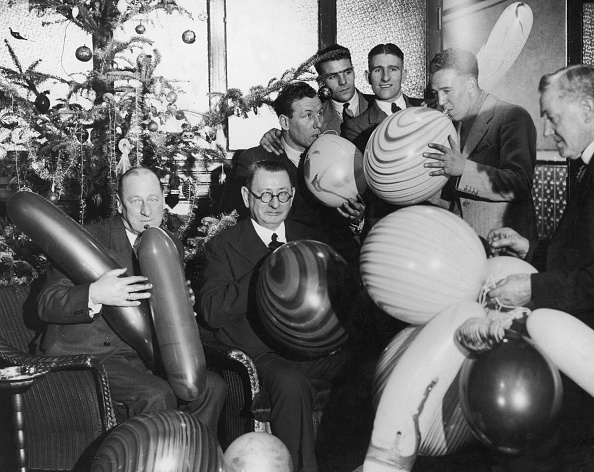'Tis the season for holiday parties, hijinks, harassment and lawsuits

Directors and players of the Liverpool football club preparing for their Christmas party in December 1936. Photo by Fox Photos/Getty Images.
It’s December, and for many law firms that means it’s time to put on the party hats and try to have some fun. But a celebratory event like a holiday party can quickly devolve into drunkenness, inappropriate behavior and a litigation mess if law firm management isn’t careful, employment lawyers warn.
“I can’t tell you the number of calls I’ve gotten the week after a holiday party with concerns that someone who was drinking acted inappropriately toward a work colleague,” says Deborah Brouwer, an employment defense lawyer and managing partner at Nemeth Bonnette Brouwer in Detroit.
“Perhaps gone are the times when people put lampshades on their heads and danced on the tables, but unwanted sexual harassment still happens, and it seems to happen more frequently at holiday parties,” she adds.
When planning and executing an office party, every aspect must be scrutinized in terms of the potential consequences, according to Jessica Childress, founder of the Childress Firm in Washington, D.C. She represents employees and small businesses in work-related matters.
“Office parties need to be professional and inclusive, just like the workplace is,” says Childress, who also conducts anti-harassment and respectful workplace trainings. “What does the invitation look like? Have you told your employees the expectations for the party? What have you done to make sure there isn’t too much alcohol consumption?”
Evan Gibbs, an Atlanta-based partner specializing in employment defense at Troutman Pepper Hamilton Sanders, says he’s surprised how often he reads or hears about an office party that has gotten out of control.
“You have to put some thought into an event like a holiday party, especially if you are going to unleash a bunch of people onto an open bar,” says Gibbs.
Set appropriate expectations
Establishing expectations for behavior early on is key, according to Brouwer. She suggests using the invitation to remind employees that all the normal professional rules still apply, even if the event is held after hours and off-site.
Another way of making expectations known is by announcing a policy regarding alcohol consumption, such as establishing that each guest will be given one or two drink tickets. However, if alcohol is offered at a party, there will likely be some individuals who try to get around any drink limit. Firm management should keep an eye on individuals whose behavior appears to be crossing the line into overconsumption, inappropriate language or unwanted touching, says Brouwer.
In addition, she advises that firms provide guests with free ride-share services to avoid anyone driving home under the influence. Another suggestion is to have a luncheon instead of a nighttime party.
“A luncheon is less likely to get out of hand. It’s a low-risk way to thank everyone, and then afterward, you let them go home early,” says Brouwer.
Location, location, location
Law firms can choose to have big nighttime parties at off-site locations with music, a bar, appetizers and dancing. But a more extravagant event sets a tone that is different than a smaller event on the firm’s premises. There can be a tendency for lawyers and staff to lose their inhibition at off-site events, potentially forgetting they are still with their co-workers, according to Childress.
“If the drinks are flowing, people may feel like they are at a wedding and not a work event,” she says. “It just may mean that management will have to keep an eye on behavior and remind people that just because they are not in the office doesn’t mean they can do anything.”
Brouwer has also seen companies and law firms choose to host more informal holiday parties at bars or entertainment venues. Some law firms choose to host their parties as axe-throwing facilities, bowling alleys or indoor mini-golf lounges.
“The more informal you get with your party location, the more informal the behavior,” says Brouwer. “If the party is a competitive event and people get into it, it’s important to make sure that the behavior doesn’t cross the line into something that can be perceived as bullying.”
After-parties can also be a problem, says Chris Dolan, who represents employees. People can get disorderly adds the San Francisco lawyer, who suggests warning employees beforehand about expectations regarding both behavior and social media use.
“I would suggest that all law firms tell their employees not to engage in or circulate on social media rowdy and unprofessional behavior,” says Dolan, who founded the Dolan Law Firm. “You don’t want to circulate online photos of lawyers lining up shots.”
Decorations matter
Even the party decorations must be carefully considered. The invitation and the decorations should be inclusive, says Brouwer, with consideration taken for employees, staff and guests that don’t celebrate Christmas, for whatever reason.
“The cultural sensitivity your firm shows in the workplace should extend to the holiday party,” says Brouwer. “The idea of this event is that everyone feels good at the end of it, so the party planners should be taking every step to make sure that happens.”
And avoid hanging mistletoe. It’s a bomb waiting to go off, says Childress.
“The idea of mistletoe is that you catch a person under the mistletoe, and then you kiss them,” she explains. “You could have a lawyer thinking, ‘Let me kiss my colleague under the mistletoe because it’s tradition.’ But that is obviously highly inappropriate and could potentially lead to a sexual harassment claim.”
Finally, law firms should avoid making attendance at an office party mandatory.
“Some people don’t celebrate Christmas or the holidays, and some people just don’t like parties,” says Gibbs.
Write a letter to the editor, share a story tip or update, or report an error.


